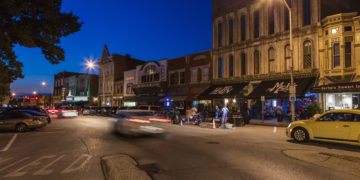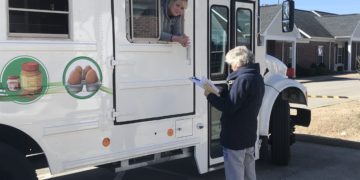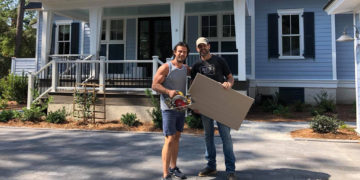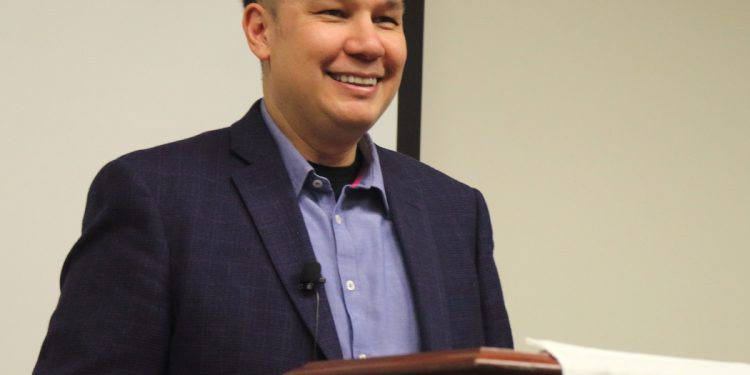It’s no surprise to Warren County Public Library patrons that Bowling Green is often one of the best-attended stops on New York Times best-selling and award-winning authors’ major book tours.
WCPL is a welcoming mecca and tourist destination for visiting writers, avid readers, aspiring writers and enthusiastic fans attending free, ticketed author events. The Bob Kirby Branch, located at 175 Iron Skillet Court, was significantly enlarged in 2014, in part to better host these successful programs, along with Friends of the Library and SOKY Book Fest fundraising book sales. Author talks are held in expandable multi-purpose meeting rooms that can accommodate several hundred patrons.
Barnes and Noble staff efficiently handle on-site book sales and as a bonus, fans may (within reasonable limits: no wheeled suitcases full, please!) bring previously purchased copies of the current book or back catalog for post talk signings.
WCPL’s roster of authors and presenters during the past year included Dr. Travis Stork, Hillbilly Jim and Gary P. West, Bret Baier, Greg Iles, David Bell, Karin Slaughter, Thomas George and Random House Publishers best-selling author Jamie Ford in November.
The evening began with the planned interview, followed by an invitational meet-and-greet reception for the five WCPL book clubs. (Note: The newest one is “Get Lit: Bookish Happy Hour” and adults only as members meet bimonthly at the Preservation Tasting Room & Bottle Shop). You could feel the love when Lisa Rice introduced Ford to the near-capacity crowd for the main event of author talk, reading, Q&A session, followed by a book signing. It’s a rare pleasure when an admired author is as warm, friendly and charming in person as one might imagine from reading their work.
Ford draws, in part, on his blended American heritage for inspiration. Paternally, he is fourth generation Chinese descendant from a Nevada mining pioneer Min Chung who arrived in 1865, then renamed himself William Ford. Maternally, a Mayflower descendant whose family came from England in 1620. He was born in Eureka, Calif., in 1968 and raised in Ashland, Ore., until age 12 when his family returned to Seattle where his grandparents resided. He has a degree in design from the Art Institute of Seattle and a well-established career culminating in creative director of advertising, specializing in tourism marketing before he began writing novels. Jamie and his wife Leesha, now empty-nesters, reside in Great Falls, Mont., where they work, volunteer and raise their blended, self-described “Brady Bunch” family of six teenagers.
His interest in fiction writing developed as he honed his skills with a handful of published short stories and by attending writers workshops. Ford’s 2009 debut novel The Hotel on the Corner of Bitter and Sweet ignited a stunning publishing phenomenon rarely achieved by first-time authors and yearned for by established writers with few signs of slowing down. Proverbially, it was like hitting the lottery or batting a home run to Neptune. Rave reviews and word-of-mouth selling kept Hotel on the New York Times and other media outlet best-seller lists for two years.
While relaxing before the WCPL event, Jamie learned from his publicist that his first book went into its 56th printing. It’s been translated into 35 languages, is mandatory reading for Washington high school students and has moved onto reading lists for students in other states. This multi-award winning novel was a top selection at Borders, Barnes & Noble, Costco and Target; the No. 1 Book Club Pick by the American Booksellers Association in Fall 2009/Winter 2010; a runner-up for the 2009 Langum Prize for historical fiction and the Adult Fiction honor at the 2010 Asian/Pacific American Award for Fiction.
Ford is working on two historical fiction novels; one is for young adults.
Published in 2013, Songs of Willow Frost debuted at No. 11 on the New York Times Fiction Bestseller list. His current book, Love and Other Consolation Prizes, also set in Seattle, again published by Random House, Ballantine Imprint, in September is wending its way to blockbuster status. This haunting, heart-wrenching novel spans two world fairs: the 1909 Alaska-Yukon-Pacific Exposition in Seattle and the 1962 Space Needle World’s Fair. Narrator Ernest Young is the 11-year-old Chinese orphan who is raffled off as “an item” donated by the orphanage to the exposition and won by Seattle’s most successful Madame. He spoke about the genesis of the idea for this richly woven novel.
Jamie Ford (JF): “At Seattle’s first world fair, they had themed days, and every day had a theme with a prize. On agriculture day, they raffled off a milking cow. On mining day, they raffled off 3,000 copper ingots. And on September 15, 1909, the day President Taft visited the World’s Fair in Seattle, it was Washington Children’s Day, and they raffled off a boy named Ernest. He was donated by the Washington Children’s Receiving Home. There was an ad in the Seattle Times advertising this giveaway and quotes by L.J. Covington, the director of the receiving home, anticipating this giveaway of a boy, and no one knows what happened to Ernest after he was claimed. I’ve always been fascinated by this story and chose to write his life story between the two World’s Fairs. In my story he is won by a woman named Florence Nettleton better known as Madame Flora who ran a high class parlor joint in Seattle’s vibrant red-light district.”
He commented on research for this book: I do interview people for research and I tracked down an expert on Seattle’s red light district. I flew to Seattle to meet “Maggie” for coffee. I didn’t realize she is a high paid escort and also a public librarian. She was a fascinating person who changed my perception of escorts and librarians at the same time!
We sat down with Ford to pick his brain on ….
How old were you when you got your first library card?
Jamie Ford: I’d say the age I was when I got my first bank account: third grade. The Ashland, Ore., Carnegie-built library and the bank (were) right across the street. I went down (with my mother), and I got my library card and then my bank account with my little blue piggy bank.
BGL: What do libraries mean to you?
JF: I met my wife in the public library, so they mean something special to me. When I was little, I was a latch-key kid. Both my parents worked, all my siblings worked and as a third/fourth grader, I would walk from my school up to the public library and I would just hang out until about 5:30 when my mom would pick me up. I was always immersed in books. I never minded that because I would read every book about dinosaurs and next, every book about flying saucers. It was a cool place! I’m not making this up, the first time I ever skipped school, I went to the public library. I broke up with my high school girlfriend and was all emotional and just went to the library. The library has always been my central, go-to place. I’m on the Foundation Board for Great Falls, Montana Public Library. I go to city council meetings once or twice a year and occasionally remind that one city council member why we have libraries. I’m kind of a defender of the faith about libraries.
BGL: Would you share about meeting your wife at the library?
JF: Libraries are community hubs. I met my wife at that hotbed of swinging single’s activity known as the public library. It wasn’t single’s night or wet T-shirt night at the library, and I wasn’t hanging out in the 300 section hitting on strange women that cruise by. If you don’t remember your Dewey Decimals, the 300s are Human Sexuality. There was an open mic night where people were going to read poetry and prose, and everyone from a writers group we had each attended once were going to do it and we were the only ones who showed up. We ended up sitting together and talking. A year later, I proposed — in a book store.
BGL: What is your favorite banned book?
JF: Probably The Absolutely True Diary of a Part-Time Indian by Sherman Alexie. I love that book. There’s some sex in it and people lost their mind over the briefest mention of something that every 13-year-old is already thinking about, but I think it’s really important.
BGL: Did you have a writing mentor?
JF: I didn’t. I had people that were super influential. My favorite authors are probably Harlan Ellison, Pat Conroy, Sherman Alexie, Amy Tan and poet Anne Sexton. I really went from being a sort of hobbyist to an aspiring possibly professional. I went to Buena Vista, N.C., for a writing workshop (Hatrack River Literary Boot Camp) taught by a writer named Orson Scott Card. I went to that workshop as a writer and left as a storyteller. Just totally changed. … He rewired my brain basically with his style of what he thought was effective storytelling, and it was huge for me.
BGL: How difficult (or not) was it to get your first book published?
JF: My path to publishing was embarrassingly easy. I finished the manuscript for Hotel on the Corner of Bitter and Sweet went to Agentquery.com, began querying agents and had five offers in about 10 days. But my real struggle was with the book before Hotel. I spent four years writing another book that was going nowhere. I had to creatively and emotionally divorce myself from that book, mourn its passing and begin again with a blank page. That was my real struggle.
BGL: Best advice received from an author?
JF: Ivan Doig was a fine writer and a true gentleman. When I got my first bad review he said, “Give yourself 24 hours to wallow, if you must. Then get the hell over it.” Good advice.
BGL: Could you describe your writing routine?
JF: I work from a home office. I am morning person, so I’m usually up by 5 or 6, and I’m writing by 7. I write until about noon, take a break and walk my dogs to the river and then edit in the afternoons. I generally write in Batman pajamas and a Mariners hoodie. So, every writer is also a part-time fashion criminal. I am exactly that. The days when I take a shower at 4 in the afternoon are successful writing days. If I’ve taken a shower at like 10 in the morning then I must have writers block or something like that. I get most of my good writing all through the winter.
BGL: When you wrote Hotel at the Corner of Bitter and Sweet, did you dream it would be life-changing?
JF: As an artist, it’s problematic, because I have readers who have expectations. The challenge now is to create something different and bring those readers along for new adventures. I’m working on a new novel which will be quite a departure from the previous books I’ve written, but I have to keep moving forward, creatively. I think that over the course of my career, readers will respect my willingness to try different things, rather than keep serving up the same story over and over. I always feel I have to give the Hotel update because that book really is doing its own thing. I basically feel that the book has a career, and I’m just along for the ride and I stole that from Pamela Anderson. Two interesting things have happened of late. About a month and a half ago, we were finally able to reveal that Hotel has been optioned for film and is now in pre-production with George Takei, Sulu in Star Trek, as executive producer. He spent four years in an internment camp. I’m hopeful the integrity of the piece is going to remain intact. The other thing that has happened with Hotel is the book is now read widely in schools — in high school, some colleges and some very intrepid middle schools. It’s so weird because I grew up and I became homework. I get emails from students because there’s no Cliffs Notes or SparkNotes!
BGL: Which award or honor has meant the most to you?
JF: The Asian (/Pacific) American Award for Literature is probably the most meaningful, because as a half-Chinese child growing up, I never felt Asian enough. That award was validating on a personal level. But beyond that, I’m more delighted when a high school student shares that one of my books is their favorite book of all time.
BGL: What question that have you not been asked would you like to answer?
JF: A high school student asked, “What was your emotional state of mind when you wrote your first book?” I usually have a generic answer, but this time I said that my marriage had failed, I had lost both of my parents and that my world was on fire. I was heartbroken in so many ways and that writing my first book enabled me to make sense of the circus that had taken up residency in my head.
For more information on Ford, visit jamieford.com. For more information on WCPL or room reservations, visit warrenpl.org.


















